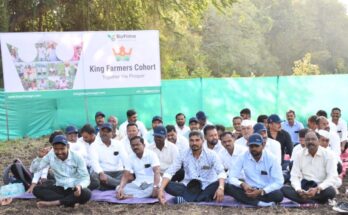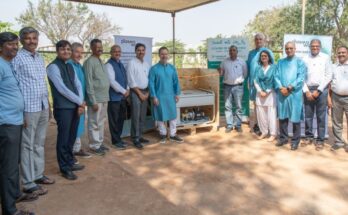Cargill, in collaboration with TechnoServe, has announced ‘Srishti’, a transformative partnership to empower 10,000 maize farming households in Davanagere, Karnataka. Through this partnership, farmers will be trained on the use of regenerative agriculture to improve soil health, sequester carbon, and improve water quality and use. This programme aims to bring 25,000 acres of farmland under regenerative and sustainable agricultural practices over the next four years.
Healthier soils are more resilient to the impacts of climate change and can increase crop productivity, helping improve farmers’ livelihoods and enhancing the sustainability of food supply chains. These efforts help farmers produce food more sustainably while boosting their profitability and climate resiliency.
The initiative was announced in the presence of Ronald P Verdnok, Minister Counsel, Office of Agricultural Affairs, US Embassy in India along with leadership teams of Cargill and Technoserve.
You may also like to read: Technology adoption is key to sustainable regenerative farming
“Cargill’s regenerative farming initiative is a fitting example of strengthened partnership between our two countries (India and US), and in the case of this programme, how a world-leading US multinational is making an investment to strengthen the sector of the Indian economy that accounts for more employment than any other and upwards of 15 per cent of GDP”, said Ronald P Verdnok said.
Over the course of four years, the partnership will focus on empowering farmers with knowledge and tools to implement regenerative farming techniques by delivering comprehensive training, resources, and sustained support. Additionally, the initiative will address critical challenges such as water conservation, access to finance, and better market linkages, ensuring a comprehensive approach to sustainable agricultural development.
Simon George, president of Cargill in India said, “Regenerative agriculture starts on the farm. That is why Cargill is supporting farmer-led efforts to scale regenerative agriculture globally and why we are starting this programme in Davangere to create a lasting impact on farmers’ livelihoods and their long-term productivity. Leveraging our deep experience in the food and agriculture domain, coupled with TechnoServe’s success in sustainable development programmes, this partnership will foster transformation in the agricultural landscape in India and bring positive environmental outcomes.”
You may also like to read: IITM Pravartak, WayCool Foods join hands to bring regenerative agriculture tech stack to farmers
“We’re excited to kickstart our new programme ‘Srishti’ in Karnataka with Cargill, our longstanding partner globally and in India. Over the next four years, the programme will support 10,000 farming households in building climate-resilient livelihoods by enabling the adoption of regenerative agriculture and water conservation practices. The economic empowerment of women from these farming households will also be a focus area for the programme”, said Punit Gupta, Country Director, TechnoServe India.
Regenerative agriculture is founded on traditional and indigenous soil health practices and integrating them with modern technology and innovation for a more targeted approach. To efficiently implement these practices at scale, this programme will be working on helping farmers adopt regenerative practices like bund plantation, cover cropping and low tillage; expanding the water harvesting capacity of farming households sustainably through farm ponds and borewell recharge structures; promoting sustainable use of community land to ensure afforestation of degraded pastureland; and collaborating with farmer producer organisations (FPOs) as focal points for farmers awareness and engagement, besides accessing inputs required for regenerative practices and enhancing remunerative market linkages.
Farmers will also be upskilled in good agricultural practices like nutrient management, pest and disease management, pre and post-harvest practices and improved irrigation practices to drive positive environmental outcomes to help build a more resilient future.





